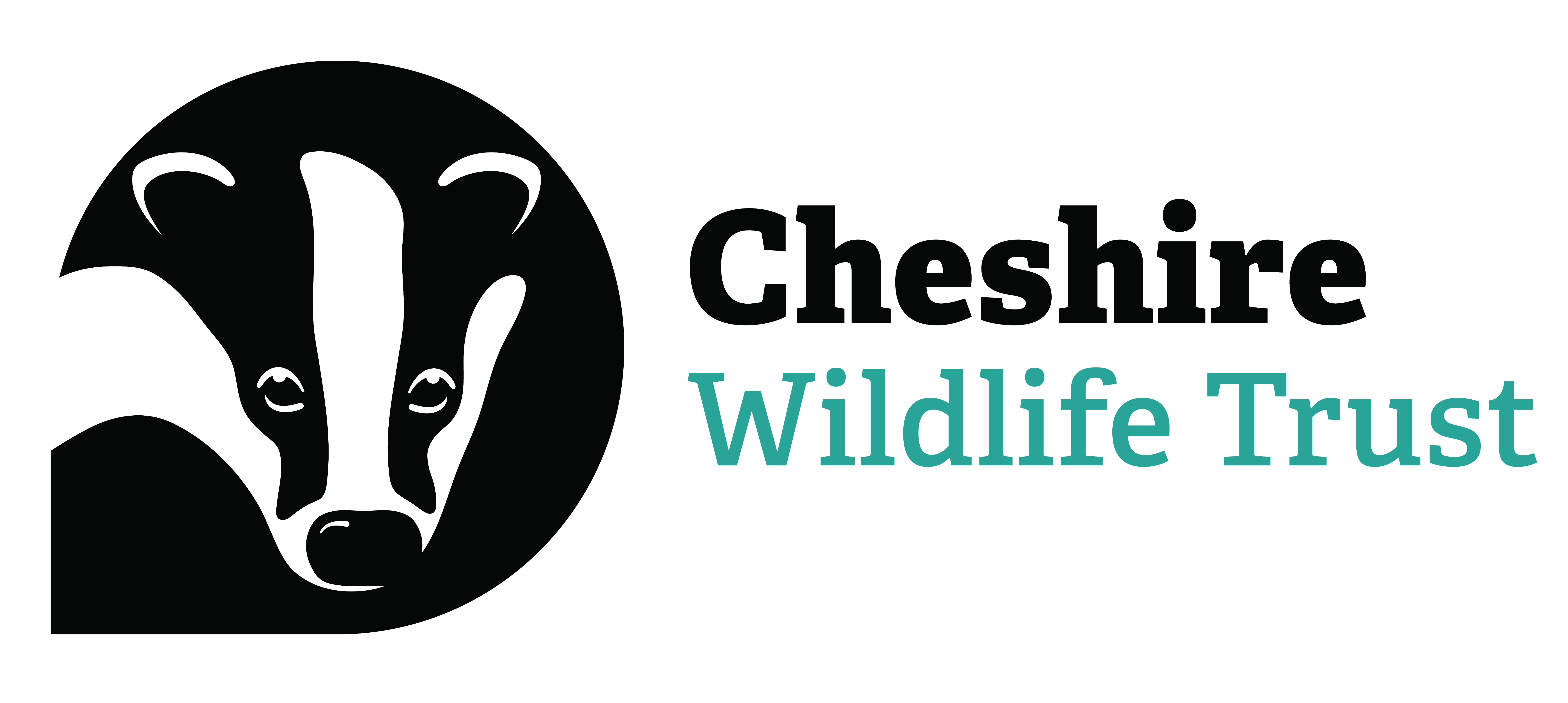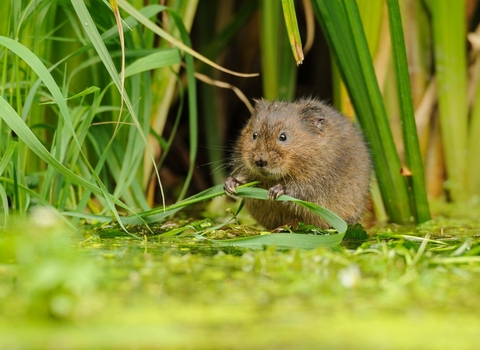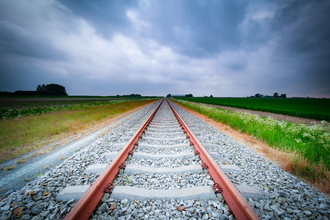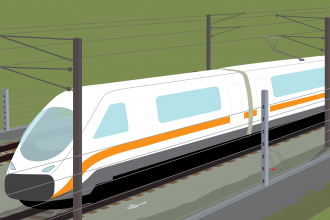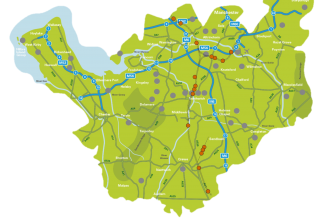HS2 are short-changing nature
HS2 is Britain’s largest infrastructure project and is costing hundreds of billions of pounds. It could have been an opportunity to deliver more for nature but instead, we’ve uncovered mistake after mistake and nature is paying the price.
Dr Rachel Giles, and our team at Cheshire Wildlife Trust, have now produced what is the only independent fact-check into HS2 Ltd’s nature-loss claims. The results are shocking with a catalogue of errors stretching from London to Crewe. It all adds up to a staggering toll of losses for the countryside, in places, the damage to nature is 8 times greater than official figures show.
It’s untested, it’s fundamentally flawed and it’s not fit for purpose.House of Commons Transport Select Committee - Sept 2022
What did our team find?
- Nature that's gone missing
Trees are missing, many streams and hedgerows are not mapped, ponds are sliced in half and then only half-counted. Valuable wild spaces such as parks, old cemeteries and re-wilded sites are often not properly recognised.
- Overestimating the impact of replacement habitats
Wildlife-rich hedgerows filled with trees are getting replaced with much poorer quality replacements that won’t deliver as many benefits to wildlife. HS2 don't seem to have noticed.
- The lack of transparency
It took four years for HS2 to release its data. For this reason, there has been no scrutiny into whether their claims are actually correct. We need to make sure HS2 are delivering on their promises.
- An out of date approach
HS2 are using their own way of calculating nature loss that is untested and over ten years out of date. It falls well below the current standards. We should be doing the best we can for our wildlife.
As a charity, we are only able to do everything we have for wildlife thanks to our supporters.
What else is happening in Cheshire?
Two miles North-West of Tatton Park is our Sean Hawkins Nature Reserve, a small but nature-rich site that was donated to us to protect wildlife. The meadow and surrounding woodland sit within Millington Clough a tranquil valley carved out by Agden brook and is home to a population of water voles, a nationally endangered mammal.
In spring, a rich purple and gold tapestry of bluebells and marsh marigolds fills the valley. In summer, birdsong fills the air. In autumn, the leaves of the sycamore trees turn the valley into a blazing sunset. Sadly, this reserve will be compulsory purchased to make way for HS2.
We need your help to challenge HS2 ltd.
We will not let HS2 Ltd underestimate the damage the scheme will do to wildlife and we will take every opportunity to push for better outcomes for nature.Cheshire Wildlife Trust
Why we are challenging HS2
Cheshire Wildlife Trust supports sustainable transport but the environmental damage HS2 is causing makes this project completely unsustainable. Nature is already in crisis and the current HS2 design will only make things worse by leaving nature smaller and more fragmented.
We believe it doesn’t have to be this way. For nature to thrive we know that nature must be bigger, better and more connected. With the right mitigation in place, HS2 could be an example of how big infrastructure projects can support nature’s recovery.
FAQs
What is HS2?
HS2 is the proposed High Speed rail network for the UK - connecting London to Birmingham and Manchester. Cheshire Wildlife Trust is actively challenging HS2 ltd on the devastating impact the project will have on nature and condemning it for its failure to deliver on its environmental promises. Join our campaign and help us hold HS2 ltd accountable.
Who are HS2 Ltd?
HS2 Ltd is the company responsible for developing and promoting the UK’s new high speed rail network. It is funded by grant-in-aid from the government and sponsored by the Department for Transport.
One of its core responsibilities is to ensure HS2 is built and operates sustainably, responsibly and respectfully of the communities, wildlife and places it affects.
What have Cheshire Wildlife Trust done to challenge HS2 Ltd?
July 2023: The Wildlife Trust goes to Downing Street for the second time to hand in a letter signed by over 100,000 people. The letter asks for two Secretaries of State to make HS2 remap all the impacted habitats, recalculate its nature-loss figures and start using industry best practice instead of its ten years out of date method that is no longer fit for purpose.
February 2023: The Wildlife Trusts launches its latest report into HS2. This investigation is the only independent audit of HS2's nature-loss claims, led by Dr Giles' team here at Cheshire Wildlife Trust. The report finds systematic failings in the way HS2 have calculated their impact to nature. Dr Giles and the team conclude it is 'fundamentally flawed' and based on data ‘riddled with inaccuracies’ and calls for HS2 to go back and remap all sites impacted.
September 2022: Dr Rachel Giles gives evidence at the Transport Select Committee on HS2's nature failings and calls their nature mapping 'a joke'. She gives them early access to a new report on HS2s nature loss claims that her team have spent the past year working on.
August 2022: We announce that Sean Hawkins Nature Reserve is set to be compulsory purchased by HS2. The reserve is home to water voles, one of the most endangered species in the country that's at risk of local extinction. We petition the House of Commons over the failings of HS2 to compensate for the loss of this water vole habitat.
August 2021: The Wildlife Trusts call on MPs to attend the HS2 debate arranged by the Petitions Committee.
June 2021: Cheshire Wildlife Trust co-signs a letter to the Chair of HS2 Ltd calling for detailed plans on how the project will first achieve no net loss in biodiversity and, second, achieve Biodiversity Net-Gain
January 2021: We lobbied Warrington South MP, Andy Carter, about the future of Phase 2b and Northern Powerhouse Rail.
December 2020: We responded to design changes to the Phase 2b route and send a copy to all MPs on the HS2 line in Cheshire and South Manchester.
September 2020: We voiced our concerns to Tatton MP, Esther McVey and Macclesfield MP, David Rutley.
February 2020: We took Altrincham MP, Sir Graham Brady, to Davenport Green Wood to show him the impact of HS2 in his constituency. Two weeks later, he speaks out in the House of Commons about the damage to this site.
February 2020: Chief Executive of Cheshire Wildlife Trust, Charlotte Harris, hand delivered the signatures of over 66,000 people, urging the Prime Minister to Stop and Rethink HS2.
January 2020: We launched our Stop and Rethink HS2 campaign urging the Prime Minister to rethink the overall design and plans for HS2. We send a copy of our new report to all MPs in Cheshire and South Manchester.
December 2019: We designated 12 new Local Wildlife Sites along the route of HS2, hopefully helping to secure better mitigation when they are impacted.
May 2019: We submitted another petition in relation to additional changes to the Phase 2a scheme which will particularly impact water voles. We took our concerns to the Houses of Parliament for the second time forcing HS2 to agree to better measures to help support the water vole population in south Cheshire.
December 2018: We responded to the draft Environmental Statement for Phase 2b of the scheme which will run north from Crewe. Our response can be found here.
July 2018: We took our concerns to the House of Commons and secured assurances from HS2 Ltd. that they will contribute to a landscape and environment fund. This money should secure approximately 35 hectares of habitat creation.
October 2017: We submitted a response in relation to HS2 Ltd.’s methodology and calculations for the amount of biodiversity that would truly be lost.
March 2017: We submitted our response to the route refinement consultation for Phase 2b and the supporting documents.
2015/16: Cheshire Wildlife Trust met four times with HS2 representatives to discuss the potential impacts of the scheme on our local wildlife. We encouraged HS2 Ltd. to make decisions based on the best available environmental evidence. We had input into the consultation into the Environmental Impact Assessment Scope and Methodology.
HS2 in Cheshire (https://www.youtube.com/watch?v=OBKbDyFxfzU)
Cheshire Wildlife Trust staff explore some of the sites that HS2 is set to destroy
Our reports and responses
HS2 Double Jeopardy Report - February 2023
HS2 Double Jeopardy Report - February 2023
House of Commons Petition - August 2022
Cheshire Wildlife Trust's responses
Impact of HS2 in numbers
HS2 Impacts in Cheshire region (including South Manchester and Warrington)
Total Area HS2 Phase 2a = 441 Ha
Total Area Phase 2b = 1259 Ha
Total Area HS2 = 1700Ha
Phase 2a
2 Local Wildlife Sites direct hit on route
58.5 Ha of Local Wildlife Sites will be lost = 85 football pitches
6 Potential Local Wildlife Sites direct hit on route
3.4 Ha of Potential Local Wildlife Sites will be lost = 5 football pitches
*average football pitch = 1.7 Ha
Phase 2b
30 Local Wildlife Sites direct hit on route (including 7 ancient woodlands)
28 Ha of Local Wildlife Sites will be lost = 40 football pitches
15 Potential Local Wildlife Sites direct hit on route (including 1 ancient woodland)
10 Ha of Potential Local Wildlife Sites will be lost = 15 football pitches
Our concerns relating to Phase 2a of the scheme (West Midlands to Crewe)
The 5 mile section of HS2 Phase 2a that stretches northwards from the Cheshire/Staffordshire boundary up to Crewe is, in parts, significantly wider than much of the route due to two additional spurs which will run parallel to the HS2 mainline. Worryingly, the section which passes through the ecologically sensitive Meres and Mosses Nature Improvement Area, is almost half a mile (750 metres) wide including the associated earthworks. The area is also a Local Wildlife Site designated for declining farmland birds such as the yellow wagtail as well as important populations of bats. Red listed yellow wagtail is a rapidly declining species, and this one site represents one of just 12 known breeding sites in the county and possibly the only population in South East Cheshire.
Cheshire Wildlife Trust have looked at the proposed mitigation in detail and have concluded that there is a failure to include measures to mitigate or compensate for the loss of nesting, roosting and foraging habitat for farmland birds and inadequate measures to compensate for the loss of bat foraging habitat at this site. We are also concerned about the impact on water voles. This species has suffered a massive 81% decline in Cheshire in the past 20 years and HS2 is set to directly impact one of the last remaining populations in Cheshire. This could bring about the extinction of the local population, just one of four remaining populations in the county.
More widely there is a massive shortfall in the amount of compensatory habitat provided in south Cheshire. This is contrary to HS2 Ltd’s commitment to ‘developing an exemplar project, and to limiting negative impacts through design, mitigation and by challenging industry standards whilst seeking environmental enhancements’.
HS2 have committed to achieving no net loss of biodiversity at a route-wide level but the losses of wildlife habitat in Cheshire are not being compensated for locally and will happen elsewhere, meaning the knock-on effects on the species that depend on these habitats will be enormous.
In July 2018 our appearance at the House of Commons Select Committee for HS2 helped to secure a large lump sum for an environment and landscape fund. The money is to help mitigate the impacts to the Local Wildlife Site and is enough to fund the creation of approximately 35 hectares of new habitat. Since 2018 changes to the scheme have been announced which will mean further losses of habitat on the Local Wildlife Site, as well as additional losses of wildflower grassland and woodland. CWT has submitted a second petition to the HS2 select committee, securing the right to present evidence at the House of Commons.
Our concerns relating to Phase 2b of the scheme (Crewe to Manchester)
The Cheshire Wildlife Trust have submitted a consultation response to HS2’s proposals to extend the track from Crewe to Manchester. We highlighted that the scheme will result in unacceptable losses of wildlife in the Cheshire region, carving up valuable areas of irreplaceable ancient woodlands, felling ancient trees and destroying 216 ponds. Many of the species that will be impacted have already suffered shocking declines in recent years and Phase 2b of HS2 will only exacerbate this.
Cheshire Wildlife Trust are particularly concerned that the amount of compensatory habitat proposed is a fraction of what is actually needed if ‘no net loss of biodiversity’ is to be achieved – a claim made by HS2 in their Environmental Policy.
The knock-on effects for species such as bats, birds, water voles, brown hares, common lizards and grass snakes will be significant if not enough new habitat is created. By destroying the habitats these species feed and breed in High Speed Rail may result in the loss of vulnerable species from certain areas of the region. More needs to be done to prevent this scenario and the Cheshire Wildlife Trust will campaign to ensure that a stop is put to the current plans and urge the Government to rethink the design of the scheme.
